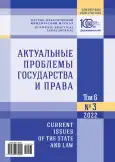Problems of evaluation and use of the results of operational search activities in the process of evidence
- Authors: NOVIKOV A.M.1, KHORYAKOV S.N.1
-
Affiliations:
- Moscow Academy of the Investigative Committee of the Russian Federation
- Issue: Vol 6, No 3 (2022)
- Pages: 429-436
- Section: Процессуальное право
- URL: https://journal-vniispk.ru/2587-9340/article/view/303843
- ID: 303843
Cite item
Abstract
The process of proof is the central link around which criminal proceedings are built. The event, the circumstances of which are to be established, took place in the past, and it is impossible to reproduce it in all details in the present. But, as you know, every crime leaves traces. Evidence is material and ideal traces that appear in the objective world and which must be collected, verified and evaluated in order to properly consider and resolve the case. At present, the subjects of proof make a large number of mistakes, as a result of which the evidence is recognized as inadmissible, which sometimes entails a review of the court decision and the re-qualification of the actions of the guilty person, thus at the present stage, a close and comprehensive study of the problem is required in connection with the relevance of existing issues (problems), requiring solutions in order to eliminate gaps in the criminal procedure legislation and bring to the uniformity of practice. So, for example, the activities of employees engaged in operational-search activities are an invaluable source of data aimed at assisting in the collection of evidence, and is also often the starting point in the activities of the investigator, interrogating officer. The procedure for the procedural registration of the results of operational-search measures, the procedure and conditions for using them as evidence should be regulated by the criminal procedure legislation. The actual problems of using the results of operational-search activity in proving in criminal cases are considered. The analysis of legislation, judicial practice and opinions of procedural scientists on this issue was carried out. Particular attention is paid to the problems of legalizing the results of operational-search activities in the framework of procedural evidence in a criminal case. The ways of solving the studied problems are proposed.
About the authors
Alexander M. NOVIKOV
Moscow Academy of the Investigative Committee of the Russian Federation
Author for correspondence.
Email: alexandernovirov2011@yandex.ru
ORCID iD: 0000-0002-8434-7217
Professor of Criminal Procedure Department
Russian Federation, 12 Vrubel St., Moscow 125080, Russian FederationSergey N. KHORYAKOV
Moscow Academy of the Investigative Committee of the Russian Federation
Email: horser1@yandex.ru
ORCID iD: 0000-0002-9078-4675
Candidate of Law, Associate Professor, Associate Professor of Criminal Procedure Department
Russian Federation, 12 Vrubel St., Moscow 125080, Russian FederationReferences
- Alferov V.Y., Grishin A.I., Ilin N.I., Chernyshev B.V. Osnovy teorii dokazatel’stv v ugolovnom sudoproizvodstve Rossii [Fundamentals of the Theory of Evidence in Criminal Proceedings in Russia]. Saratov, Plekhanov Saratov Social and Economic Institute Publ., 2017, 196 p. (In Russian).
- Vladimirov L.E. Ucheniye ob ugolovnykh dokazatel’stvakh [The Doctrine of Criminal Evidence]. Tula, Avtograf Publ., 2000, 426 p. (In Russian).
- Lupinskaya P.A. (executive ed.). Ugolovno-protsessual’noye pravo Rossiyskoy Federatsii [Criminal Procedure Law of the Russian Federation]. Moscow, Jurist Publ., 1997, 591 p. (In Russian).
- Andreyev O.I. Nazarov A.D., Stoyko N.G., Tuzov A.G. (eds.). Ugolovnyy protsess [Criminal Process]. Rostov-on-Don, Phoenix Publ., 2015, 445 p. (In Russian).
- Pobedkin A.V. Ugolovno-protsessual’noye dokazyvaniye [Criminal Procedural Evidence]. Moscow, Yurlitinform Publ., 2009, 408 p. (In Russian).
Supplementary files








